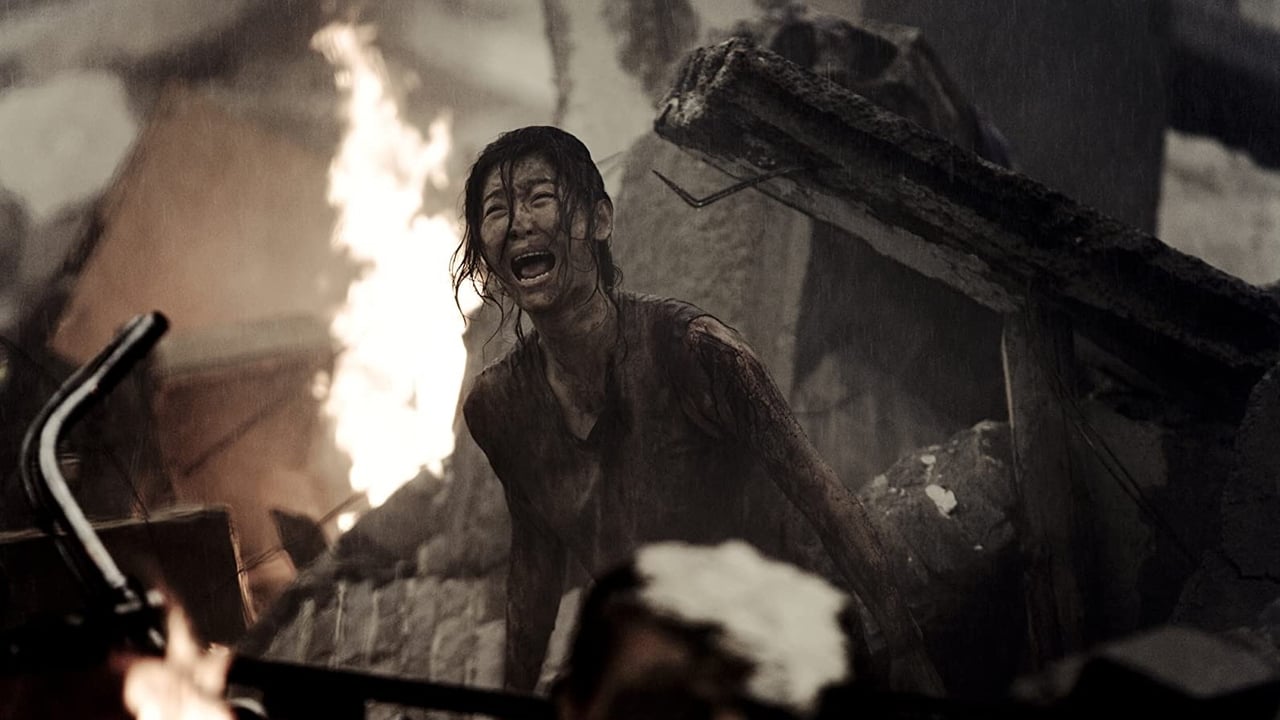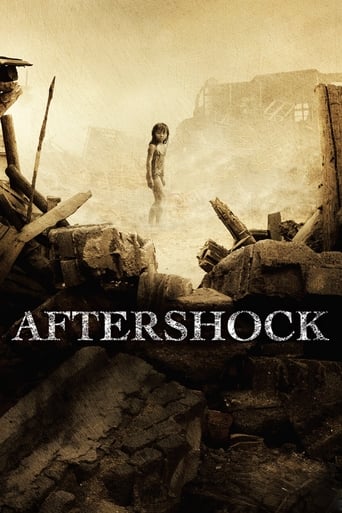

There's not many films I've seen that really open the tear ducts but I was literally crying within the first ten minutes such is the power of the setup and the opening section of the film. It is based around the infamous earthquake of 1976 where 240,000 people were killed, just think of the boxing day tsunami for the human scale of this disaster.Don't expect a disaster movie with buildings blowing up and skyscrapers falling down in million dollar effects set-pieces, it's not like that. What it is, is an extremely well made ten minute segment at the start of the film in which we see wholesale destruction on a truly 'real' scale. The fact that the special effects in this film were done by 'Weta' from New Zealand, who worked on the Lord of the Rings trilogy et al, proves how remarkable they are.There is one moment when one of the after shocks hit that really got to me. A mother finds her son in the rubble and holds onto his hands, as the aftershock hits, he slips down further into the darkness as more rubble falls onto him. She turns to the sky, uncontrollable tears rolling down her face, and screams 'God, you bastard'. From that point on - that was me done, I literally cried hard. Very rare for me to do that.From then on the clean up starts and the rescue operation begins, the mother is given a choice to choose between the life of her son or daughter such is the way that a concrete slab is resting on their dying bodies.Truly emotional and it doesn't stop for a good half hour until you get a chance to wipe away the tears. From then on, then drama begins. It is an hour of drama and watching everyone grow up separately that in places is very slow but you know is building to an emotional confrontation.This is where the English title really comes into play. An aftershock is not just the rumblings of the earthquake, it is the aftershock of decisions made on the cusp of emotion. The final song over the credits is titled, 21 seconds, 32 years. So much can change in so little a time and the drama is people's inability to understand or even cope with their decisions.The girl actually survives but blames her mother for choosing her brother to be rescued so she hides her true identity to rescuers and lives 32 years before finally finding her way back. The acting is immense, amazing even on behalf of the mother and the daughter at the end.The daughter discovers her brother by chance when they both separately decide to help in the rescue of the 2008 earthquake. Their meeting is muted and not really shown on film, which is a shame, I felt that there were some scenes missing from the international cut. Yet, they hold back the emotional punch for when the daughter is finally reunited with her mother 32 years later.I've given it 9/10 because it is a truly emotional film, probably the most emotional with the subject matter that I've ever seen. The only downside is in the completeness of the story, I do feel that some scenes may have been missing.Yet, the effects at the start, the acting, the music and the emotional punch truly hold this film above many others. I'm very surprised that it was not included in the Academy's best foreign picture film. Or maybe I am, because the films that win are never quite the ones that deserve to.Stunning, I can highly recommend this, just get a box tissues ready, no matter how hard a heart you have!
... View MoreAccording to Google Translate, 'Tang Shan Da Di Zhen' in English means 'Tangshan Earthquake', but the official English title of this Chinese film is 'Aftershock'. In 1976 an earthquake strikes the city of Tangshan. Yuan Ni, whose husband has been killed in the 'quake, then has to make an agonising decision: should she save her son Fang Da, or her daughter Fang Deng? She chooses Fang Da and he grows to adulthood, eventually moving away and marrying, while Yuan Ni stays in Tangshan, unwilling to move away in case the ghosts of her husband and daughter return and are unable to find her.But, unbeknownst to Yuan Ni and Fang Da, Fang Deng also survived. She is adopted and grows to adulthood, eventually moving to Canada. But thirty years after the Tangshan earthquake, one strikes Sichuan and Fang Deng is moved to return to China to help. It is there that she finds herself sitting next to her (until then unrecognised) brother as he tells another man how his sister died in the Tangshan 'quake when their mother had to choose between them...The idea that, out of over one billion people in China, Fang Deng should bump into Fang Da just as he's unwittingly providing evidence that reveals their familial relationship is stretching coincidence to breaking point. Plus, the earthquake scenes have an obvious look of CGI about them. And I was disappointed that we did not get to see the moment when Fang Deng tells Fang Da who she is, nor how Yuan Ni reacts when she gets the news (this also denies the actors a chance to do some major emoting). But apart from those gripes, this family drama really pulls in the viewer: although I knew beforehand of the decision Yuan Ni has to make, when she was crouched on the rubble hearing rescue workers tell her only one of her children could be saved, I found myself horrified, thinking "How could anyone make such a decision?!" As I don't speak Mandarin I'm not really qualified to comment on the acting - although Zi-feng Zhang, who plays Fang Deng as a little girl, is a terrific little actress compared with some child stars, giving a natural, unstilted performance (certainly in comparison to David F Morris, the sole Caucasian in the film, whose stilted delivery of his lines as Fang Deng's Canadian husband sounds as if he was reading them for the first time). This is the first Chinese film I have ever seen, and it's certainly set a high benchmark for those that follow it.(One amusing point about 'Aftershock' is how the commercialism of modern China has affected the film: for instance, characters are seen wearing Kappa jackets (Kappa were one of the sponsors of the film); and, when one of Fang Da's staff asks him which insurance company to use, he gravely intones "Go with China Life". Sure enough, when the credits roll, the viewer discovers China Life are another of the film's backers...)
... View MoreThis movie was amazing! I didn't plan on watching it all in one night, but ended up not being able to turn it off. It was very well done and represents the Chinese culture very well. I was blown away by the length and the intensity of the movie and was impressed with the amount of information that they were able to cover. The graphics at the beginning are a little choppy, but everything else in the movie was well done. The story line is inspiring as you see the lives of this family, and so many others be completely transformed by the 1976 Earthquake of Tangshan. I highly recommend taking the time to watch the entire movie, and then act on what you have learned to help prepare yourself and others for any disaster that you might experience.
... View MoreOkay, so I bought this thinking it was a disaster film – maybe like a modern-day EARTHQUAKE with a distinctly Asian slant. The box, showing a cover image of a little girl surrounded by rubble with the tag-line 'A Turbo-Charged Blockbuster Epic Packs An Almighty Punch!', would lead you to believe that's exactly what this movie's about. Except it isn't. The earthquake happens briefly at the beginning of the film, and the subsequent devastation is of the emotional variety, taking place in a story that spans thirty years.Yes, this is melodrama, and not a disaster film at all (the earthquake scene, while good, is short and over too quickly). I could handle that if the subsequent family drama was interesting or engaging, but it left me utterly cold and untouched throughout. It's extremely overlong, featuring characters I either disliked or openly hated, and I didn't care anything about their upset or bereavement. I found the acting to be shrill and unrealistic. The film just goes on and on until a too-obvious outcome that I could have predicted a couple of hours previously with little story to sustain or indeed justify that bloated running time.
... View More